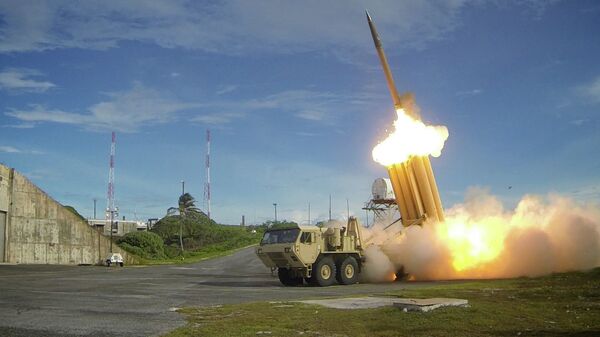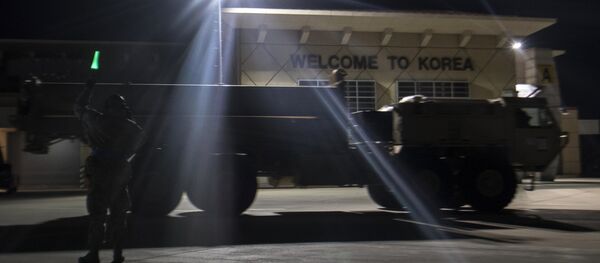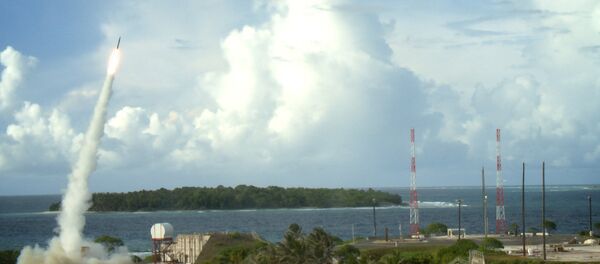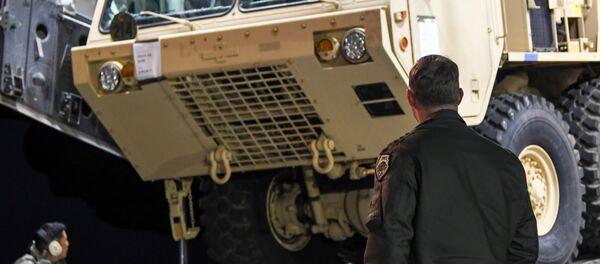China has made a statement promising to take appropriate protective measures, whereas Russia has stated that it would take into account the actions of Washington and Seoul in its future military planning.
According to experts interviewed by Sputnik, the United States and DPRK are escalating the situation on the Korean Peninsula and neither side is going to slow down anytime soon.
Speeding up the deployment
Initially, the United States and South Korea agreed that the deployment of the THAAD missile defense system in the Korean territory would occur in June-July of this year.
However, it seems that the allies apparently accelerated this process after tests held by North Korea took place on Monday night.
On March 6, the DPRK launched four missiles, three of which presumably fell in the exclusive economic zone of Japan. On Tuesday, Pyongyang announced that the military drills were held successfully.
Just two missile launchers were delivered. It was further reported that after 1-2 months the deployment of this newest missile defense system will be completed.
However, according to some Russian experts, the deployment of the US THAAD anti-missile system in South Korea is being carried out in accordance with previously reached agreements and is not related to the current worsening of the situation in the region.
The agreement to deploy the THAAD system to South Korea was reached in July 2016 between Washington and Seoul under the pretext of threats from North Korean missiles.
Russia and China are not enthused
The plans of the US and Korea caused some concern in China and Russia, who see this deployment as a step to contain their own missile capabilities.
“We will certainly take these actions into account in our foreign policy actions. This is causing aggravation of the situation in the region because this results not only into tension with Pyongyang, but also because Beijing is reacting very painfully. All this leads to an aggravation of the situation and we will of course, take this into account in our military planning,” Director of the Department for Nonproliferation and Arms Control of the Russian Foreign Ministry, Mikhail Ulyanov, told Sputnik in a comment.
The spokesman for the Ministry of Foreign Affairs of the People's Republic of China, Gen Shuan, said during a briefing that China is resolutely against the deployment and will take the necessary steps to protect its security interests.
The US reacts to Russia’s and China’s concern
In response to the statements by Russia and China against the missile deployment, US Permanent Representative to the Conference on Disarmament Robert Wood said the US missile defense THAAD system is a defense complex and placing it in South Korea does not undermine the security of other countries.
According to him, THAAD is a purely defensive system designed to counter small-to-medium-range ballistic missiles, so placing such a weapons system in close proximity to the DPRK is aimed at reducing the threat posed by this country. “It does not undermine the protection systems of other countries,” Wood said.
The future is bleak
However, such exchange of “pleasantries” is not de-escalating the situation in the region. In contrast, as Russian military expert and editor-in-chief of the magazine “Arsenal of the Fatherland” Victor Murakhovsky pointed out, the deployment of these missiles by the US will further provoke North Korea and escalate the tense situation.
“There is this mutual degree of high tension between the two sides because there is no effort from the US in terms of diplomatic efforts, aimed at establishing relations with North Korea. I do not think that this way North Korea will slow down or turn off their nuclear or missile program. On the contrary, they will pitch in more and more resources into this business,” Murakhovsky said.
Russia and China, in turn, urge both sides to show restraint. “It is Russia's firm position that only via diplomatic means can this problem be solved and China is also on the same platform, as far as this is concerned,” the expert concluded.







